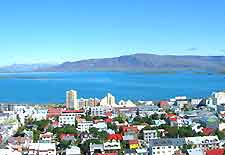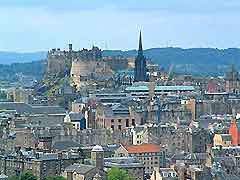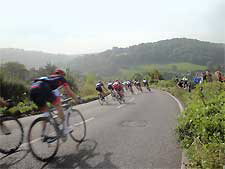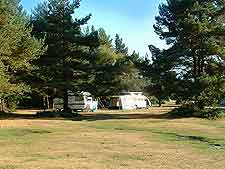World Guides Travel Blog
September 2014
This is where we let you know all about what's going on with our website and the world of travel, with destination reviews, current travel news and topical travel-related stuff to discuss with your friends. Please let us know if you want to comment on anything -
Contact us.
September 27, 2014
MONSTER HUNTING IN ICELAND

We all know about Scotland's Loch Ness monster - after all, it is been the stuff of legends and alleged sightings for centuries. But less well known is Iceland's version of the mythical creature. A couple of years ago, a video of the 'Lagarfljotsormur', as it is known in Iceland, reached the furthest corners of the Internet and caused quite a stir. Was it real or was it a hoax? In early 2014, one researcher stated that it was probably nothing more than an icy fishing net. This week, though, the question of this slippery creature has raised its head again, with a panel of experts from Iceland declaring it to be the real deal.
Reports of the Lagarfljotsormur, which roughly translates as the Lagarfljot Worm, first put in an appearance in the 14th century. According to folk tradition, the serpent-like animal was a dragon that was overly attached to a gold ring and went on to terrorise the locals who lived around the glacial-fed lake near Egilsstaoir in the eastern part of Iceland. Since then, there have been many sightings. Most notable was one by the head of Iceland's National Forest Service who, in 1963, was unable to account for the moving object that he spotted in the lake. And then there was the group of contractors who, in the 1980s, came home with a badly damaged cable and tales of a rather large beast.
There are many who say that all manner of natural phenomena could account for the monster, from trapped methane gas to tangled-up tree trunks caught in the ice. others are quick to point out that not all the sightings can be explained by science. Among them is an unofficial group who are keen to maintain and show off the heritage of the Lagarfljot Worm.
one thing is for sure: these latest deliberations over the Worm's authenticity can't have done much harm to Iceland's tourist economy.
Posted by Sue at 11:11:45 on 27/9/2014
September 19, 2014
WAITING FOR THE SCOTTISH DUST TO SETTLE

So, at last there is an end to the uncertainty about whether or not Scotland will become an independent country. Scotland will not break with the UK and, therefore, the question of whether or not independence would damage Scotland's burgeoning tourist scene will not be put to the test. Not in the near future, at least.
I knew that tourism was hugely important for the country's economy, but I didn't until now know just how important. It is estimated that currently around 200,000 people are employed in Scottish tourism in some way or other, from those who serve in Edinburgh's many gift shops to drivers of the coaches that transport visitors around the Great Glens. It accounts for over 2.5 million overseas visitors. Between them, they inject a massive £11billion into the Scottish economy.
We will never know, then, whether those who argued that independence would lead to a stronger Scottish tourist economy were right or wrong. Or whether there was a ring of truth about criticisms that border controls, visa requirements, travel insurance and currency would lead to tourist mayhem.
I've a holiday planned next year that will take me to John O'Groats via some of Scotland's most dramatic roads and spectacular scenery. Its an exciting prospect and one that won't be affected by recent referendum events. Apparently, I'm not alone. According to a recent poll by research specialists, when 700 UK visitors polled, 84 percent said that their decision to visit Scotland wouldn't be affected by the outcome of the referendum.
Sadly, all this referendum debate might upset Scotland's tourist economy in the short term anyway. Uncertainty when you are booking a holiday is never a good thing and, by all accounts, holiday cancellations have been up this year. For some people, it will be a case of waiting for the dust to settle before they think to venture north again.
Posted by Sue at 13:10:46 on 19/9/2014
September 12, 2014
BICYCLE RACE WATCHING

This morning, I stood at the top of a steep hill on the outskirts of Bath and watched as more than a hundred professional riders threw themselves and their bikes downhill at scarily swift speeds. The race was the Tour of Britain and when I heard that the sixth stage was due to pass within mere miles of my hometown, I couldn't resist. I'd regretted not going to watch the Yorkshire section of this year's Tour de France. It would be churlish of me not to watch.
There is something rather compelling about watching a swarm of fast-moving cyclists zoom past at high speed. True, it was all over in no time at all. There were times, as I shuffled from foot to foot in anticipation of those split seconds of action, when I wondered whether it was worth it. I'd spent a couple of hours of waiting in position to make sure I got a good vantage point. Before that, there was the extra traffic to contend with as I drove into the city and, of course, the hassle of finding a parking place.
The answer is, of course, that it was definitely worth it. The atmosphere was incredible. So was the camaraderie among the spectators. The build up added the necessary degree of suspense to the whole proceedings. When it came, the cycling action was dramatic. And all this in Bath, a city that has earned itself a place on the UNESCO World Heritage Site list.
Even if you are not a keen cyclist yourself, the spectacle is still worth the effort. To make the most of your experience, though, I'd advise checking the race website to see if the organisers have listed the best vantage points, ones that will maximise your view of the race riders in action. I chose to stand midway down a steep hill, next to a sharp corner. Check out road and parking closures, too. If you want to avoid the hassle of driving and parking altogether, you could always see if public transport has anything to offer. Next time a cycle race comes to a town near to you, I'd say go for it.
Posted by Sue at 13:11:40 on 12/9/2014
September 11, 2014
CARRY ON MUNICIPAL CAMPING

There is something rather liberating about not booking holiday accommodation in advance. It opens up all sort of possibilities. You simply drive along and when either daylight starts to fade or you see somewhere that takes your eye, you stop. It works in most European countries, but in France, it is easier than ever. Stop in most French towns - even relatively small ones - and ask for the nearest campsite and you will generally be directed to that mainstay of the French camping world, the 'camping municipal'. All you have to do is put up your tent, fire up the stove and and revel in a spot of al fresco dining in (usually) pleasant surroundings.
There are around 2,000 'campings municipaux' throughout France. Created in 1936 along with the advent of paid holidays for workers, today many towns or villages still have a council-run site either located close to public facilities, such as the local swimming pool or leisure centre, or on the outskirts of town.
Generally maintained by an army of local council employees, they offer washing facilities and showers that put to shame many commercial enterprises with stars to their name. You'll often find manicured hedges that act as plot dividers and allow an element of privacy, and an abundance of bakeries, restaurants and local shops that are never far away. Tucked away from the usual hot tourist destinations, booking isn't usually needed. The only exception is in coastal regions, which tend to be busier during the summer months. 'Campings municipaux' make great overnight stops. Equally, they are ideal for a longer stay, really allowing you to get to know a place.
Over the years, we've come across some great municipal campsites. Among the most memorable is the Municipal du Parc de la Noë in the Normandy town of Argentan. To me, it is the epitome of a French 'camping municipal' - mega-clean, very friendly, incredibly well priced, and situated at the heart of authentic French small town life. What more could a happy camper want?
Posted by Sue at 8:37:34 on 11/9/2014
 We all know about Scotland's Loch Ness monster - after all, it is been the stuff of legends and alleged sightings for centuries. But less well known is Iceland's version of the mythical creature. A couple of years ago, a video of the 'Lagarfljotsormur', as it is known in Iceland, reached the furthest corners of the Internet and caused quite a stir. Was it real or was it a hoax? In early 2014, one researcher stated that it was probably nothing more than an icy fishing net. This week, though, the question of this slippery creature has raised its head again, with a panel of experts from Iceland declaring it to be the real deal.
We all know about Scotland's Loch Ness monster - after all, it is been the stuff of legends and alleged sightings for centuries. But less well known is Iceland's version of the mythical creature. A couple of years ago, a video of the 'Lagarfljotsormur', as it is known in Iceland, reached the furthest corners of the Internet and caused quite a stir. Was it real or was it a hoax? In early 2014, one researcher stated that it was probably nothing more than an icy fishing net. This week, though, the question of this slippery creature has raised its head again, with a panel of experts from Iceland declaring it to be the real deal. So, at last there is an end to the uncertainty about whether or not Scotland will become an independent country. Scotland will not break with the UK and, therefore, the question of whether or not independence would damage Scotland's burgeoning tourist scene will not be put to the test. Not in the near future, at least.
So, at last there is an end to the uncertainty about whether or not Scotland will become an independent country. Scotland will not break with the UK and, therefore, the question of whether or not independence would damage Scotland's burgeoning tourist scene will not be put to the test. Not in the near future, at least. This morning, I stood at the top of a steep hill on the outskirts of Bath and watched as more than a hundred professional riders threw themselves and their bikes downhill at scarily swift speeds. The race was the Tour of Britain and when I heard that the sixth stage was due to pass within mere miles of my hometown, I couldn't resist. I'd regretted not going to watch the Yorkshire section of this year's Tour de France. It would be churlish of me not to watch.
This morning, I stood at the top of a steep hill on the outskirts of Bath and watched as more than a hundred professional riders threw themselves and their bikes downhill at scarily swift speeds. The race was the Tour of Britain and when I heard that the sixth stage was due to pass within mere miles of my hometown, I couldn't resist. I'd regretted not going to watch the Yorkshire section of this year's Tour de France. It would be churlish of me not to watch. There is something rather liberating about not booking holiday accommodation in advance. It opens up all sort of possibilities. You simply drive along and when either daylight starts to fade or you see somewhere that takes your eye, you stop. It works in most European countries, but in France, it is easier than ever. Stop in most French towns - even relatively small ones - and ask for the nearest campsite and you will generally be directed to that mainstay of the French camping world, the 'camping municipal'. All you have to do is put up your tent, fire up the stove and and revel in a spot of al fresco dining in (usually) pleasant surroundings.
There is something rather liberating about not booking holiday accommodation in advance. It opens up all sort of possibilities. You simply drive along and when either daylight starts to fade or you see somewhere that takes your eye, you stop. It works in most European countries, but in France, it is easier than ever. Stop in most French towns - even relatively small ones - and ask for the nearest campsite and you will generally be directed to that mainstay of the French camping world, the 'camping municipal'. All you have to do is put up your tent, fire up the stove and and revel in a spot of al fresco dining in (usually) pleasant surroundings.